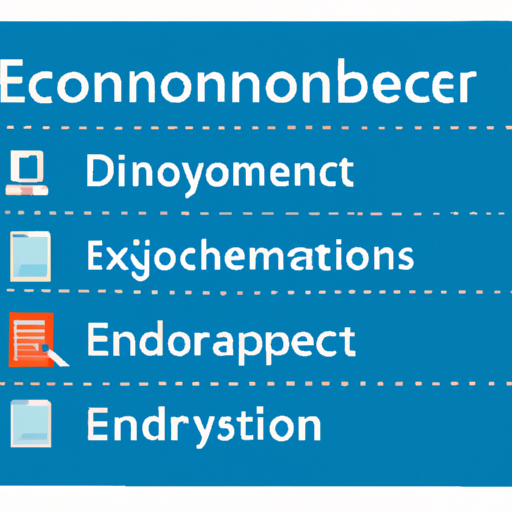The role of an economist in today’s rapidly evolving global economy is of utmost significance. As experts in the field of economics, these professionals play a crucial role in understanding and predicting market behaviors, analyzing policy impacts, and providing valuable insights into complex financial data. The economist job description encompasses a diverse range of responsibilities, varying from conducting research and collecting data to formulating economic policies and recommendations. In this article, we delve into the comprehensive job description of an economist, exploring the key skills, qualifications, and core areas of expertise required to excel in this pivotal profession.
Table of Contents
- Main duties and responsibilities of an economist
- Required skills and qualifications for an economist
- Analyzing economic data and trends
- Conducting research and providing forecasting models
- Developing and assessing economic strategies and policies
- Advising businesses and governmental bodies on economic matters
- Using statistical and mathematical tools for economic analysis
- Presenting findings and recommendations to stakeholders
- Staying updated on global economic developments and trends
- To Wrap It Up

Main duties and responsibilities of an economist
Economists play a crucial role in analyzing and interpreting complex economic data to advise businesses, governments, and organizations on financial decision-making. Their expertise in economics and statistical analysis helps them understand macroeconomic trends, assess market conditions, and forecast future economic developments. Here are some of the key duties and responsibilities of an economist:
- Conducting Economic Research: Economists engage in extensive research to collect and analyze data related to economic variables, such as employment rates, inflation, or consumer spending patterns. This research encompasses both primary and secondary data sources to provide insightful analysis and recommendations.
- Developing Economic Models: Economists create models or simulations to evaluate economic phenomena and predict the potential outcomes of various policies, events, or market changes. These models help assess the potential impact of economic decisions and provide a basis for policy formulation and strategic planning.
- Providing Economic Analysis: Economists generate reports and present findings to stakeholders, including businesses, government agencies, or non-profit organizations. They offer expert economic analysis, forecasting, and strategic advice tailored to the specific needs of their clients, assisting them in making informed decisions and optimizing their financial performance.
- Monitoring and Evaluating Economic Policies: Economists continuously assess the effectiveness of economic policies implemented by governments, identifying potential strengths and weaknesses. By monitoring policy outcomes and conducting cost-benefit analyses, they ensure that economic policies align with desired objectives and recommend adjustments or alternatives as necessary.
In summary, economists serve as invaluable resources in understanding the complexities of the economy and its impact on various sectors. Through their diverse range of responsibilities, they contribute to shaping policies, improving financial decision-making, and driving sustainable economic growth.

Required skills and qualifications for an economist
To successfully fulfill the role of an economist, individuals are expected to possess a unique blend of skills and qualifications. These attributes are critical to understanding complex economic trends and formulating well-informed recommendations. Here are the key requirements for aspiring economists:
- Strong Analytical Skills: Economists should exhibit exceptional analytical abilities, allowing them to dissect complex data sets, identify patterns, and draw conclusions. Proficiency in statistical analysis and mathematical modeling is crucial to effectively interpret economic phenomena.
- Excellent Research Aptitude: Extensive research is a fundamental aspect of an economist’s job. The ability to gather, evaluate, and gather relevant data from multiple sources is imperative for accurate and comprehensive analysis.
- Advanced Knowledge of Econometrics: A solid foundation in econometrics is essential. Proficiency in econometric techniques and statistical software enables economists to develop models, test theories, and make accurate predictions.
- Exceptional Communication Skills: Economists must possess strong written and verbal communication skills to effectively convey their analysis and findings. They should be able to distill complex economic concepts into clear and concise reports that can be easily understood by non-experts.
Furthermore, a master’s degree in economics, finance, or a related field is usually required to pursue a career as an economist. While not mandatory, relevant work experience or internships in the field can significantly enhance an individual’s chances of securing a job as an economist.

Analyzing economic data and trends
An economist plays a crucial role in , providing valuable insights into the financial landscape of an organization or a country. With a keen eye for detail and a deep understanding of economic theories and principles, economists gather, interpret, and evaluate vast amounts of data to identify patterns and trends that can inform decision-making processes. Their analysis may include factors such as supply and demand, inflation rates, employment figures, and industry trends.
Using sophisticated statistical models and econometric techniques, economists are able to draw meaningful conclusions and develop forecasts that help businesses, governments, and policymakers make informed choices. Their findings are often presented in reports and presentations, providing clear and concise explanations of complex economic concepts and their potential impact on various stakeholders. Moreover, economists frequently collaborate with other professionals such as statisticians, policymakers, and industry experts to ensure the accuracy and relevance of their analysis.
- Quantitative Analysis: Economists employ advanced statistical techniques to analyze numerical data, identify correlations, and quantify relationships between different economic variables.
- Macroeconomic Research: They study the broader economic trends and factors that influence a country’s overall economic health, such as GDP growth, interest rates, and international trade.
- Forecasting: Economists use historical data and economic models to predict future trends, enabling businesses and governments to adapt strategies and policies accordingly.
- Policy Evaluation: They assess the impact of existing economic policies, both domestic and international, on various sectors and stakeholders, suggesting improvements if necessary.
In conclusion, the role of an economist extends far beyond simply . Their expertise and insights are invaluable for understanding the complexities of a fluctuating economy, mitigating risks, and driving evidence-based decision-making.
Conducting research and providing forecasting models
As an economist, one of your key responsibilities will be conducting in-depth research to analyze economic trends and market conditions. This involves gathering and examining data from various sources, such as government reports, surveys, and financial statements. You will need to have a strong analytical mindset and be proficient in using statistical software tools to process and interpret this data effectively. By meticulously studying economic indicators, you will be able to identify patterns, forecast future economic outcomes, and provide valuable insights to guide decision-making for businesses, governments, or organizations.
In addition to conducting research, you will be responsible for developing forecasting models. Using your knowledge of economic theories and statistical methods, you will construct models that can predict changes in variables such as inflation rates, unemployment levels, or market demand. These models will serve as valuable tools for assessing the potential impact of economic policies, market fluctuations, or industry trends. It will be essential for you to continuously refine and update these models, staying informed about the latest economic developments and incorporating newly available data. Your ability to create accurate and reliable forecasting models will greatly contribute to the success of decision-makers relying on your insights.
Developing and assessing economic strategies and policies
is a crucial aspect of an economist’s job. This responsibility requires in-depth knowledge of economic theories, statistical analysis, and the ability to interpret complex data. Economists play a pivotal role in analyzing the current state of the economy and identifying areas of improvement.
One key aspect of an economist’s job is to conduct thorough research and gather relevant data to assess the impact of existing economic policies. This involves analyzing various economic indicators, such as GDP growth, inflation rates, and unemployment rates, to determine the effectiveness of current strategies. Economists also collaborate with government agencies, private organizations, and research institutions to gather comprehensive data and insights. They use sophisticated mathematical models and statistical techniques to analyze this data and provide evidence-based recommendations for policy improvements.
Furthermore, economists play a significant role in developing new economic strategies that can address emerging challenges and drive sustainable growth. They create economic models to forecast the impact of proposed policies, considering factors such as tax reforms, trade regulations, and fiscal stimulus. These experts assess the potential risks and benefits of different strategies and provide detailed reports to policymakers. By evaluating the strengths and weaknesses of various approaches, economists contribute to the development of robust and effective economic policies that can foster growth, stability, and socio-economic well-being.
To summarize, economists are highly skilled professionals who are responsible for . Their expertise enables them to analyze complex data, conduct thorough research, and provide evidence-based recommendations for policy improvements. By working closely with various organizations and using sophisticated models, economists play a vital role in shaping economic policy decisions that impact the well-being of individuals, businesses, and nations.
Advising businesses and governmental bodies on economic matters
Economists play a vital role in advising businesses and governmental bodies on various economic matters. With their deep understanding of economic principles and their ability to analyze complex data, economists provide invaluable insights that can shape policies and strategies.
In this role, economists are responsible for conducting thorough research and data analysis to assess the economic impact of different policies, regulations, and business decisions. They use their expertise to forecast economic trends and identify potential risks and opportunities. Through their research, economists help businesses and governmental bodies make informed decisions that can optimize economic performance.
- Policy Development: Economists contribute to the development and evaluation of economic policies by studying their potential outcomes and providing evidence-based recommendations. They consider the impact of policies on various stakeholders, such as consumers, businesses, and the overall economy.
- Market Analysis: Economists examine market conditions and trends to assess supply and demand dynamics, pricing strategies, and competition levels. This analysis helps businesses and governmental bodies understand market behavior and make informed decisions regarding pricing, production, and resource allocation.
- Financial Risk Assessment: Economists evaluate financial risks associated with economic decisions and help businesses and governmental bodies mitigate potential losses. They analyze factors such as inflation, interest rates, and exchange rates to assess the impact on financial stability and recommend strategies for risk management.
Overall, economists are trusted advisors who guide businesses and governmental bodies towards sustainable economic growth and stability. Their expertise in economic matters contributes to shaping policies, optimizing resource allocation, and fostering a healthy economic environment.
Using statistical and mathematical tools for economic analysis
Statistical and mathematical tools play a critical role in an economist’s job description, enabling them to make informed economic analyses and predictions. These tools provide economists with the ability to gather and analyze large sets of complex data, uncovering patterns and correlations that can offer valuable insights into various economic phenomena. By using statistical techniques such as regression analysis, economists are able to identify the relationships between different variables and evaluate the impact of various factors on economic outcomes.
Moreover, mathematical tools are essential for economists to build and interpret economic models. These models allow economists to simulate and study different economic scenarios, making predictions about the potential consequences of various policy decisions or market developments. Mathematical equations, formulas, and calculations provide a framework for economists to understand and explain economic concepts, theories, and trends. Additionally, mathematical optimization techniques help economists find the optimal solutions to complex economic problems, such as maximizing utility or minimizing costs. Overall, proficiency in statistical and mathematical tools is crucial for economists to conduct rigorous economic analysis and provide evidence-based advice to businesses, governments, and other organizations.
Presenting findings and recommendations to stakeholders
One of the crucial responsibilities of an Economist is presenting their findings and recommendations to stakeholders. This includes compiling and analyzing vast amounts of data to identify patterns, trends, and potential economic implications. Once the analysis is complete, economists must effectively communicate their findings, often through written reports, presentations, and meetings.
When presenting their findings and recommendations, economists utilize a variety of techniques to ensure clarity and understanding. They employ data visualization tools, such as graphs and charts, to present complex economic concepts in a more digestible and visually enticing manner. Additionally, economists must possess excellent communication skills to convey their insights to diverse audiences, including executives, policymakers, and other stakeholders. They use concise and persuasive language to elucidate the intricate economic theories and their practical implications.
Staying updated on global economic developments and trends
As an economist, it is crucial to stay updated on the ever-evolving global economic developments and trends. By doing so, you ensure that your analysis and predictions are based on the most accurate and current information available. Here are a few key strategies to help you stay ahead:
- Engage in thorough research: Dedicate time to reading academic papers, reports, and articles written by renowned economists and institutions. Stay informed about the latest economic theories, models, and empirical findings that can shape your understanding of global economic trends.
- Stay connected: Participate in conferences, seminars, and workshops organized by professional associations, think tanks, and research institutions. These events provide the opportunity to exchange knowledge, insights, and collaborate with fellow experts in the field.
- Utilize online resources: Take advantage of the vast availability of online resources, including economic websites, news portals, and blogs. Follow reliable sources that provide comprehensive coverage of pressing economic issues and allow you to access up-to-date data easily.
Moreover, the use of data visualization tools can be invaluable when interpreting complex economic trends. By creating clear and insightful visual representations of data, you can enhance your ability to communicate your findings effectively. Lastly, it is essential to consistently reassess and update your skills and knowledge to adapt to the changing economic landscape. By investing in professional development opportunities, such as workshops or online courses, you can stay updated on the latest analytical techniques and methodologies, further enhancing your expertise.
To Wrap It Up
In conclusion, the profession of an economist encompasses a wide range of responsibilities and skills essential for the analysis and understanding of the complex world of finance, markets, and economic systems. From conducting research and data analysis to offering expert advice and making informed predictions, economists play a crucial role in shaping economic policies and guiding businesses towards success.
The job description of an economist entails the ability to gather and analyze large volumes of data, identifying trends and patterns, and providing insightful interpretations. They must possess excellent quantitative and analytical skills, coupled with a deep understanding of economic theory and principles. Additionally, economists must have strong communication skills to effectively convey their findings and recommendations to various stakeholders, including government officials, corporate executives, and the general public.
Moreover, the field of economics is constantly evolving, requiring economists to stay abreast of the latest advancements and economic trends. Continuous learning, research, and professional development are crucial for economists to maintain their expertise and contribute effectively to the field.
As the global economy becomes increasingly interconnected, the demand for competent economists continues to grow. Economists have the unique opportunity to influence vital decisions, drive policy changes, and contribute to sustainable economic growth.
In summary, an economist’s role is fundamental in understanding and addressing the challenges and opportunities within our ever-changing economic landscape. With their specialized knowledge and expertise, economists provide invaluable insights that pave the way for informed decision-making, promoting stability, growth, and prosperity for individuals, businesses, and nations.
